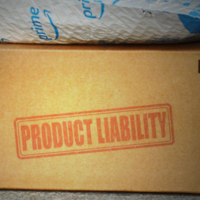
Phenomenon or Pandemic: Pondering the Potential Legal Implications of the E-scooter Craze
July 19, 2019
On July 12, 2019, YouTube celebrity Emily Hartridge died from injuries she sustained in a collision between an electric scooter (“e-scooter”) she was riding and a truck in London, England.[i] This high profile incident helps bring to light the legal phenomenon being created by the e-scooter rental industry. More and more, e-scooters are popping up in cities across the country, and around the world.
Many U.S. cities have begun allowing e-scooter vendors to supply e-scooters as local transportation options. In Florida, the City of Fort Lauderdale was the State’s e-scooter program pioneer, which debuted its Dockless Mobility Permit Program on November 1, 2018.[ii] Miami[iii] and Tampa[iv] recently adopted pilot programs allowing the use of e-scooters in various parts of the city where pedestrian traffic is heavy.
Renting an e-scooter is fairly simple, and virtually anyone can do it. All someone needs to do is download the e-scooter vendor’s app to a smartphone, enter a credit card for payment, and scan the bar code located on the e-scooter to unlock it. The rental cost is generally $1 plus 15 cents per minute.
These e-scooters are small enough and versatile enough to be driven on sidewalks and streets, through both pedestrian and automobile traffic. Most cities allow the speed of these publicly available e-scooters to reach 10-15 mph; although reported glitches have allowed some e-scooters to exceed 20 mph.[v] People operate these e-scooters in busy urban centers, which inevitably lead to accidents that cause injury to persons and property, ranging from the minor to the devastating, such as was the case with Ms. Hartridge.
As of June 2019, there were reportedly over 1,500 injuries and at least eight known deaths in the U.S. linked to e-scooter accidents.[vi] It is logical that e-scooter operators would generally be liable for injuries and damage caused by any negligence they commit in collision-related accidents. Additionally, ordinary product liability laws would likely govern if injury or damage is caused by a defect in the e-scooter. But injuries and liability issues related to e-scooters are not necessarily limited to such incidents. There is a seemingly wide variety of legal questions that can, and likely will be raised by this proliferation of e-scooters.
Florida’s dangerous instrumentality doctrine “imposes strict liability on the owner of a motor vehicle who voluntarily entrusts that motor vehicle to an individual whose negligent operation causes damage to another.”[vii] Like an ordinary car, an “electric scooter” is considered a motor vehicle under Florida law.[viii] Does this translate to the liability of an e-scooter vendor for the negligence of e-scooter operators? If so, what is the effect of the Graves Amendment, which generally bars a State or political subdivision from holding the owner of a motor vehicle vicariously liable if the owner is “engaged in the trade or business of renting or leasing motor vehicles”?[ix] Are the e-scooter vendors subject to any State financial responsibility laws imposed upon a motor vehicle owner?
Unlike renting a car, one does not necessarily need to be of legal driving age to access and operate these e-scooters. What happens when the operator is a minor? When the operator has insufficient insurance or no insurance at all? When the operator commits a hit and run where the e-scooter vendor can be identified, but not the operator? How will the injured parties be protected in such instances?
In addition to the liability issues arising from collisions while being operated, unsuspecting third parties may also be trapped in the e-scooter web. Once e-scooter users reach their destinations, they generally just leave them where they stop. E-scooters are often carelessly discarded by their operators at random places, both public and private, creating trip hazards. What is the municipal liability where e-scooters are allowed to be used on public sidewalks and streets? What is the liability of private property owners on whose property these e-scooters are left? Do municipalities and property owners owe a duty to discover e-scooters left on or near their property and ensure that the hazards they pose are eliminated? Are the e-scooter vendors liable to property owners who suffer injuries or damages trying to remove discarded e-scooters from their property? Do the property owners have a right to impound e-scooters left on their property, or on adjacent public property?
We have barely scratched the surface on the legal issues surrounding rideshare programs such as Uber and Lyft. There is very little case law on rideshare liability and the relationship and responsibilities of the involved parties. Many states have even enacted rideshare legislation (e.g Transportation Network Company (TNC) Acts) in an effort to address the issues. Can we expect to see similar legislation for the e-scooter industry?
The number of e-scooters on public sidewalks and streets will likely continue to grow, as e-scooter popularity seems to be in full swing, and because e-scooter vendors appear to be eager to accommodate the demand. With this growth, how will the courts and legislatures address the corresponding legal issues?
For any further questions, please contact William Linero.
[i] http://news.met.police.uk/news/appeal-for-information-and-footage-following-wandsworth-fatal-collision-375800
[ii] https://www.fortlauderdale.gov/departments/transportation-and-mobility/transportation-division/programs-policies-and-initiatives/dockless-bike-and-scooter-sharing
[iii] https://www.miamigov.com/Services/Transportation/Miami-Scooter-Pilot-Program
[iv] https://www.tampagov.net/tss-transportation/programs/shared-electric-scooter-pilot-program
[v] https://www.consumerreports.org/product-safety/safety-glitch-lets-some-electric-scooters-exceed-local-speed-limits/
[vi] https://www.consumerreports.org/product-safety/deaths-tied-to-e-scooters/
[vii] Aurbach v. Gallina, 753 So.2d 60, 62 (Fla. 2000).



